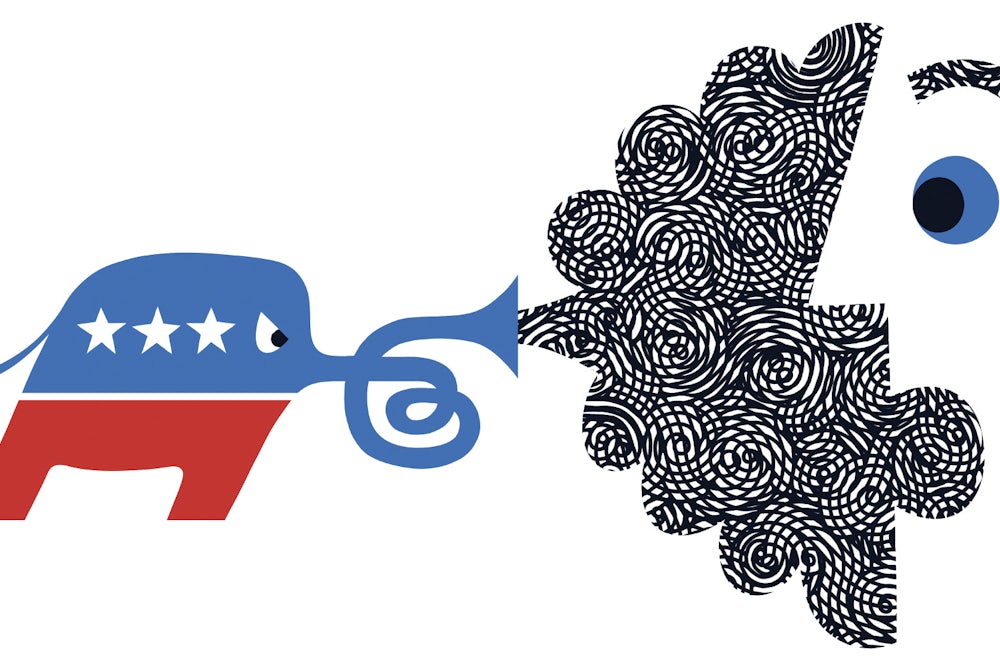Republicans might consider themselves the party of freedom, but their true identity, as the presidential campaign has made clear, is the party of fear. “We are on the road to decline, and we are running out of time to fix it,” Senator Marco Rubio said in January. In a recent super PAC ad, New Jersey Governor Chris Christie says, “My number one priority as a leader is to make sure that there is not another generation of widows and orphans created because of a terrorist attack on the American homeland.”
At December’s debate, all the candidates, with the partial exception of Senator Rand Paul, painted a frightening picture of America as a country that is on the verge of disintegrating.
“We need strength,” Donald Trump said“. “We don’t have that level of respect that we need. And if we don’t get it back fast, we’re just going to go weaker, weaker and just disintegrate.”
Trump is often portrayed as an anomaly among the GOP candidates, but consider Christie’s opening statement. “America has been betrayed,” he said. “We’ve been betrayed by the leadership that Barack Obama and Hillary Clinton have provided.” As evidence, Christie pointed to a Los Angeles school district closing over a bomb hoax. “Think about the effect that that’s going to have on those children when they go back to school tomorrow wondering, filled with anxiety whether they’re really going to be safe.”
One might wonder how Obama and Clinton are responsible for the school district overreacting to a hoax. One might also wonder about a presidential candidate who uses the Los Angeles incident not to criticize overreaction to perceived threats but to stoke fear.
All the candidates spoke of an America under siege. Paul offered a few libertarian caveats about the dangers of ranking security above liberty, but even he used xenophobic fear of immigrants to attack Rubio.
How did fear come to loom so large in Republican rhetoric? The crucial turning point surely was September 11, 2001, which gave birth to a culture of fear in America—about which a small but vital literature has emerged, such as Susan Faludi’s The Terror Dream, Corey Robin’s Fear: The History of a Political Idea, Peter N. Stearns’s American Fear. Using historical evidence, Stearns argued“ there are “either more fearful Americans than there once were, or that their voices are louder or more sought after and publicly authorized—or both.”
The best articulation of this culture of fear—and the concomitant willingness to do almost anything to secure an impregnable level of security—can be seen in the 1 percent doctrine articulated by Vice President Dick Cheney: “If there’s a 1 percent chance that Pakistani scientists are helping Al Qaeda build or develop a nuclear weapon, we have to treat it as a certainty in terms of our response.” In effect, Cheney was calling for the United States to become one giant safe space, even if it meant massively overreacting to threats abroad.
A language prioritizing safety has increasingly shaped other parts of society, including academia. In September, Nicholas Dirks, chancellor of the University of California, Berkeley, argued that freedom of speech has to be tempered“ by the need for safety and civility: “[W]e can only exercise our right to free speech insofar as we feel safe and respected in doing so, and this in turn requires that people treat each other with civility.”
The post–September 11 culture of fear inevitably stifled free speech. In 2002, Michael Kinsley wrote“ in Slate, “I have been censoring myself and others quite a bit since September 11. By ‘censoring’ I mean deciding not to write or publish things for reasons other than my own judgment of their merits. What reasons? Sometimes it has been a sincere feeling that an ordinarily appropriate remark is inappropriate at this extraordinary moment. Sometimes it is a genuine respect for readers who might feel that way even if I don’t. But sometimes it is simple cowardice.”
The immediate post–September 11 years were a golden age for Republicans, when they were able to push a large part of their agenda, foreign and domestic. It’s no surprise they keep returning to the well: Stirring up anxiety in the electorate has been so profitable for them.
Reviving September 11 level fears is now a campaign strategy. Consider the 2014 elections, when alarmist accounts of Ebola patients, “anchor babies,” and ISIS assassins flooding the United States became a staple of GOP discourse. This fearmongering paid handsome dividends at the ballot, with Republicans winning the Senate and strengthening their hold on the House and state legislatures. Scaring the voters works. There’s no reason for the Republicans to stop.” ▫
